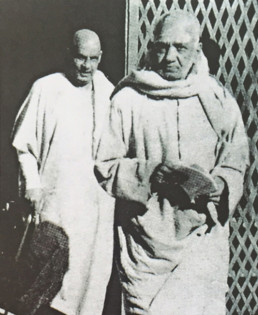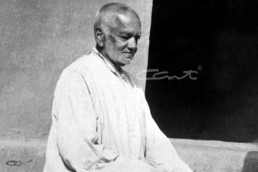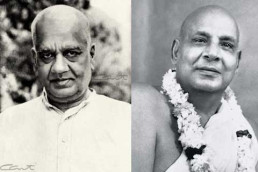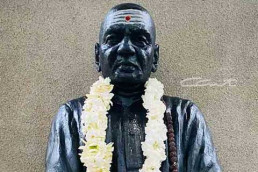
By Swami Tapovanam
In honor of Swami Sivananda
All of us are familiar with the beautiful article ‘Sri Swami Tapovanam: An Embodiment of Ideal Sannyasa’ written in November 1947 by Swami Sivananda Maharaj, but hardly anyone knows about this wonderful article written in September of the same year by Swami Tapovan Maharaj, on the occasion of the sixtieth birthday of Sri Swami Sivananda Maharaj. He writes about Swami Sivananda – ‘I know him; I love him; and I have been looking at his activities and progress with a gladdening heart for the last so many years. We are very closely connected with each other by mutual love and respect.’
Swami Padmanabhananda, the General Secretary of the Divine Life Society, unearthed it from an old souvenir and published it in their magazine The Divine Life in the September 2011 jayanti issue. And he was kind enough to grant us permission to reproduce it here. I am sure all our readers will enjoy this article that brings out the close friendship and mutual reverence between two great Mahatmas, the Diksha Guru and the Vidya Guru of our Gurudev, Swami Chinmayananda.

By Swami Tapovanam
In honor of Swami Sivananda
All of us are familiar with the beautiful article ‘Sri Swami Tapovanam: An Embodiment of Ideal Sannyasa’ written in November 1947 by Swami Sivananda Maharaj, but hardly anyone knows about this wonderful article written in September of the same year by Swami Tapovan Maharaj, on the occasion of the sixtieth birthday of Sri Swami Sivananda Maharaj. He writes about Swami Sivananda – ‘I know him; I love him; and I have been looking at his activities and progress with a gladdening heart for the last so many years. We are very closely connected with each other by mutual love and respect.’
Swami Padmanabhananda, the General Secretary of the Divine Life Society, unearthed it from an old souvenir and published it in their magazine The Divine Life in the September 2011 jayanti issue. And he was kind enough to grant us permission to reproduce it here. I am sure all our readers will enjoy this article that brings out the close friendship and mutual reverence between two great Mahatmas, the Diksha Guru and the Vidya Guru of our Gurudev, Swami Chinmayananda.
ब्रह्मैवेदममृतं पुरस्ताद्ब्रह्मपश्चात् ब्रह्म दक्षिणतश्चोत्तरेण।
अधश्चोर्ध्वं च प्रसृतं ब्रह्मैवेदं विश्वमिदं वरिष्ठम्॥
brahmaivedamamṛtaṃ purastādbrahmapaścāt brahma dakṣiṇataścottareṇa.
adhaścordhvaṃ ca prasṛtaṃ brahmaivedaṃ viśvamidaṃ variṣṭham..
Verily, all this is the immortal Brahman above, below, in front, at the back, on the right, on the left. It is everywhere. All this world is indeed the supreme Brahman. 1
आत्मैवेदं समिति ॥
ātmaivādhastādātmopariṣṭāt ātmāpaścā- dātmā purastādātmā dakṣiṇata ātmottarata
ātmaivedaṃ samiti..
The Self indeed is below, the Self is above, the Self is behind, the Self is in front, the Self is in the south, the Self is in the north, the Self indeed is all this. 2
āścaryamadya mamabhāti kathaṃ dvitīyaṃ nitye nirastanikhilāśiva citprakāśe..
After realising the Self, it is a wonder to me how in the eternal light of Consciousness which is devoid of all impurities, anātmā which is impermanent, full of impurities, and insentient, appears at all! 3
Realisation of this Upanishadic truth is the aim of human life. This sarvātma bhāva – this advaita bhāva – is the root cause of all the divine qualities which are the foundation of The Divine Life. Divinity and unselfishness can be attained only by this sarvātma bhāva. Without having attained this sarvātma bhāva, the qualities of love, modesty, generosity, equality and service etc. become selfish, narrow and momentary. No perfection, no peace, no joy and no jivan-mukti can be attained without this sarvātma bhāva.
ātmanaḥ pratikūlāni pareṣāṃ na samācaret.
That which is not good for oneself should not be done unto others. 4
This advice of the great law-maker, Manu, also can be practiced fully and perfectly only by those wise men who have realised this sarvātma bhāva. And only these realised souls are really entitled to teach and preach divine qualities and divine life to others, because the world is benefitted only by the teachings of such religious teachers who speak as they have realised and practised. Now-a–days even those who have no faith in God pose to be the devotees and seers of God and preach about God, God-realisation and godly qualities. A greedy man preaches renunciation, a haughty man advices modesty, and an idol of hatred becomes the teacher of love. That does more harm than good to the society. And killing the conscience is always more sinful than the killing of many brahmins and cows. Not only wise men, but God also laughs seeing the drama of such spiritual masters.
Go to Ananda Kutir at Rishikesh. You can see an embodiment of this sarvātma bhāva there, who deserves to be the real and great master of divine knowledge, divine qualities and divine life. I mean Srimat Swami Sivananda, the widely known and respected sage of the present age. His love and modesty have no bounds, because they are derived from the real sarvātma bhāva. Though he is a sannyāsi of the best type, of great tyāga and vairāgya, his love made him a man of service. Love never makes a man sit quiet before the troubles and miseries of his brothers. I quote an incident of his great love described in my Sanskrit book Ishwara Darshan from my own experience.
“Once, when Swamiji (Tapovanji) was residing somewhere below Brahmanandashrama, Sri Sivanandaji came to him one day at noon and said in English, “A Bengali sadhu is residing with me. For the last few days he has been very ill. Just to give him, I want a little milk. I have been going from ashram to ashram for a few ounces. But it has not been available. There is no way to get it except on payment from some shop. If only I had two annas!” Sri Tapovanji too had been depending entirely on bhiksha. He kept no pie of his own. Yet, somehow, he managed to get four annas and with humble prostrations, handed it over to Swami Sivananda, praising his great kindness and love of service. Swamiji whole-heartedly admired and respected Swami Sivananda for his loving acts of kindness and noble qualities.”
There was not a single pie kept by him at that time. Mark his burning spirit of renunciation! Yet, in that virakta stage also, he wanted to serve others. See his burning love and sympathy towards the sick and helpless. His modesty also is unparalleled. Though he has taken birth in an ancient orthodox and proud brahmin family of South India, he does not hesitate even to take the dust of the feet of the non-brahmin householders. Such modesty can rarely be seen even in the mythological Rishis of yore.
I know him; I love him; and I have been looking at his activities and progress with a gladdening heart for the last so many years. We are very closely connected with each other by mutual love and respect. Both of us are sons of South India, the mother of so many world-renowned saints, philosophers and acharyas. Both of us came to Rishikesh as sannyāsins and began our Himalayan tapaścarya almost at the same period. But afterwards, I began to live in the caves of Badrinath and Gangotri — I don’t know why, but I liked it. He preferred to stay on at Rishikesh itself and stuck to his tapasyā there, and in course of time, became a great master of divine life by his spiritual attainments and activities.
I have not written these lines to praise him. I have written these lines simply to record my admiration towards his perfect sarvātma bhāva, the mother of all his divine qualities. I think that this great quality is the secret of his success in spiritual life. When I remember Swami Sivanandaji, this great quality of that great saint comes to my remembrance more readily than his learning, authorship, religious leadership and all other uncommon qualities and activities.
Now, all over the country, the sastyabdapūrti day of this great spiritual genius is being celebrated by his disciples, friends and admirers. I remember him with a loving and respectful heart, and send him my greetings in the form of these Sanskrit ślokas on this auspicious occasion, sitting here in the solitude of my Himalayan hut, because I know he loves and respects the Sanskrit language naturally by instinct. Why not? He is the descendant of a highly famous and unrivalled Sanskrit scholar Maha Mahopadhyaya Sri Appayya Deekshitar. I quote here one incident of my life from my remembrance in connection with Appayya Deekshitar for the amusement of the readers. When I was studying ‘Kuvalayānanda’, an alaṅkāra (rhetorical) work of Appayya Deekshitar, at the early age of 17 or 18 in my house at Malabar, I put the question to the preceptor Shastri: “Who is this Appayya Deekshitar, the writer of such a beautiful and majestic work, ‘Kuvalayānanda’?” Shastriji could not answer the question, because he was completely ignorant of the life of Deekshitar. He was ashamed. The incident passed off. Though I could not get any knowledge at that time about his life, great admiration and respect towards his great Sanskrit learning and scholarship was produced in my mind. That Appayya is the forefather of our beloved Sivanandaji. This piece of information has given me immense joy and wonder, and now also gives me whenever I remember that.
2 Chhandogya Upanishad, 7.25.2
3 Sankshepa Sariraka, 4.57
4 Mahabharata, 5.15.17
Previous Topic
One Goal – Many Paths
Swami Tapovan Maharaj beautifully and concisely explains how the three paths of Bhakti, Karma Yoga and Yoga all help to…
Next Topic
Song for Swami Sivananda
Swami Tapovanam had composed a poem in honor of Swami Sivananda on the occasion of his sixtieth birthday. Our thanks to Swami…
Home Page
Homage to Sri Swami Tapovanam
The 50th anniversary edition of Tapovan Prasad (December 2011) was entirely dedicated to our Paramaguru Swami Tapovan…


